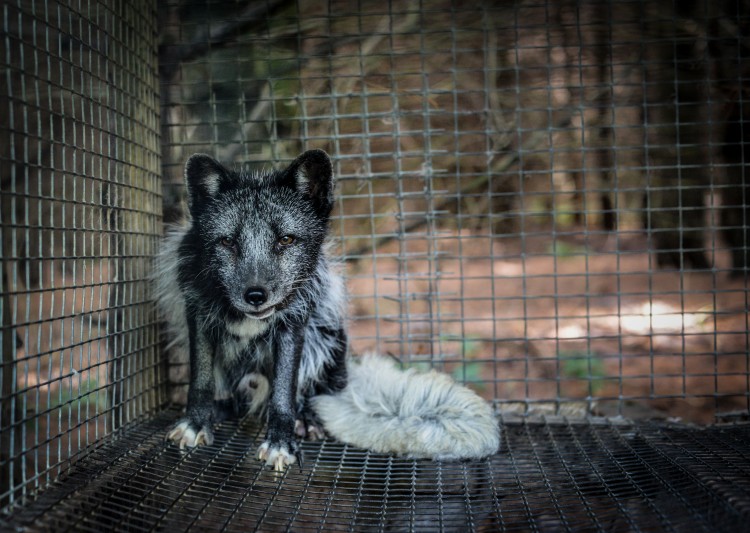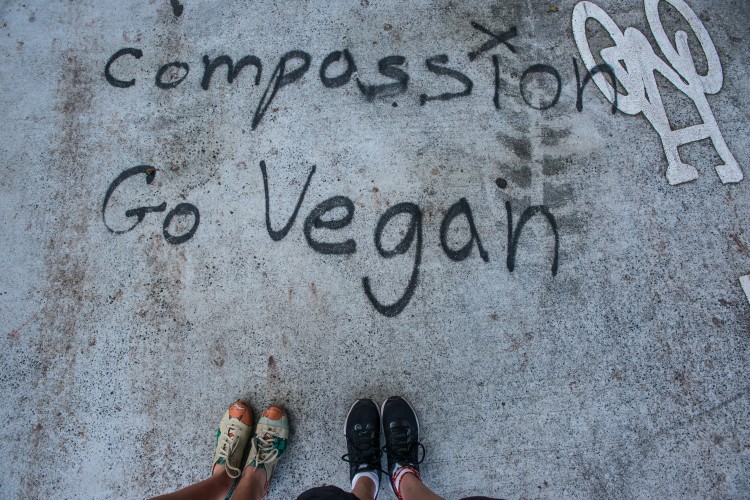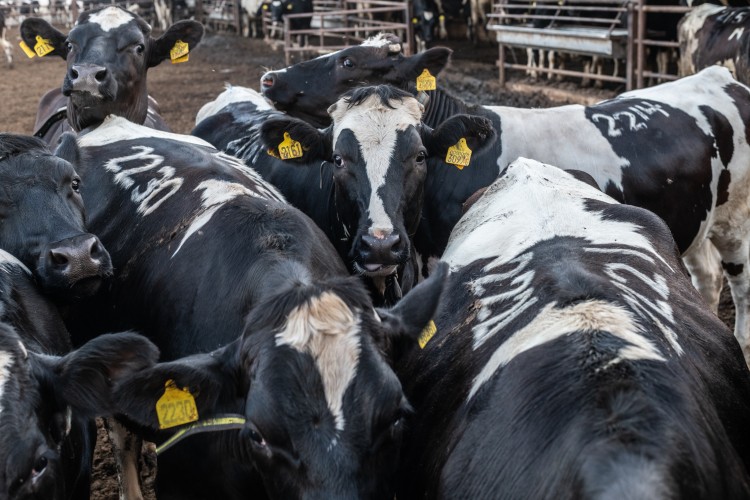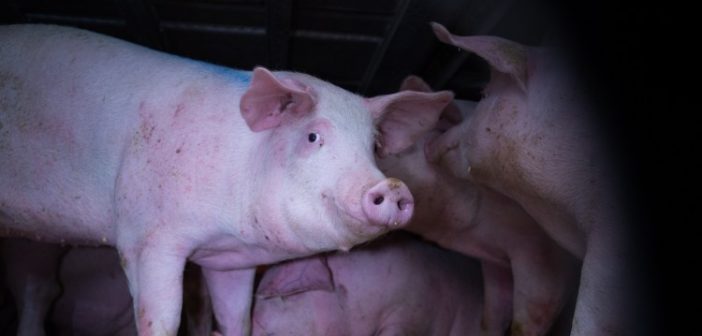In a recent post, I summarized a talk by Anoushavan Sarukhanya, “About the Necessary Paradigm Shift Needed in the Animal Rights Movement.” Anoushavan proposed that the vegan/animal liberation movement needs a stronger claim — a call for abolition rather than a call for people to “go vegan.” This second post is a response to that talk. I disagree with some points made, but overall, I agree that our movement needs a better claim.
1. The focus should be on animals used as food
I disagree with this in part. Yes, it makes sense to focus on an industry that is exploiting trillions of nonhuman animals. If you take down animal agriculture, you halt the exploitation and slaughter of trillions of lives. However, I think as we are trying to change the way humans perceive their relationships with nonhuman animals, we should also continue to campaign against the use of nonhuman animals in the fur industry and vivisection (and other uses like “pets” and those who are hunted). We want people to understand speciesism and unlearn their own human supremacy. I think we need to challenge people on all the uses of nonhuman animals. This way, we present a coherent message that is against all use. I don’t think we lose anything by doing this, although each group or organization needs to think carefully about which campaigns they allocate their resources to.

2. Don’t bring environmentalism into it
I don’t agree with Anoushavan saying that we shouldn’t include environmental activism within our approach. Anoushavan uses a human concentration camp analogy: Would we say “Stop putting people in concentration camps,” or “The bodies of the dead are polluting the river, so we need to stop the pollution”? Anoushavan sees the latter ask as shifting the focus away from the victims and being more concerned about our own survival. In this example, it does. But we must take an anti-oppression approach to our advocacy. Climate justice is inextricably entwined with justice for nonhuman animals. We can’t simply isolate the animal part of the problem. It sends us down the path of single issue campaigning and the ineffective and dangerous “animals only” rhetoric that has become so prevalent in the vegan movement.
3. The claim
I agree with Anoushavan that the “go vegan” claim is weak. I think there’s a lot we need to unpack about the vegan persona. It has a lot of power to it, for sure. Morally, going vegan is clearly the right thing to do. But following a vegan philosophy should also be a political statement. In the UK, at least, veganism is on its way to being legally recognized as a belief.
Perhaps if people start seeing veganism as something that needs to be taken seriously, they’ll stop seeing it as something to be derided. A 2015 study showed that vegetarians and vegans in “Western society” — but particularly vegans — face discrimination and bias on a par with other minorities.
However, even if veganism comes to be seen as a personal belief to be considered seriously, that doesn’t necessarily lead to it being seen as a political movement.
I think the concept of “converting” people to veganism to build public support is misguided, as it works on the basis that we need to reach a tipping point. The approach is: a certain amount of people need to be vegan, before we can then ask for legal changes or, more radically, an entire system change.
There is evidence to show that a tipping point occurs at 25%. Currently, 1 to 3% of the UK population are vegan. To reach the tipping point, we need to add another 22% to that. So, we need at least another 14 million vegans. Think about what that means. We need to get 14 million people to drastically alter their lifestyle. We often hear that going vegan is easy. Well, it seems easy once you’ve been vegan for a while. But it’s not just a diet change, there’s a whole lot of psychological and social reconfiguring that people need to undertake.

Another fundamental belief of the vegan conversion approach is that once we reach the tipping point, the demand for plant-based food options will be so significant that industry will rapidly start shifting their production to plant-based food. This is the classic “supply and demand” logic of vegan influencers. It’s plant-based capitalism. There’s definitely something to be said for making plant-based food normalized and accessible. And the more public support we have, the easier it will be to call for system change. But I think our vegan heroes haven’t taken the time to consider how complex changing social norms can be.
Of course, a big lynchpin of this capitalist approach is that once veganism isn’t seen as weird or fringe, more people will feel comfortable enough to ask for the vegan option. There’s really no need for this, as already, in the UK at least, 92% of plant-based meals are eaten by non-vegans.
So, what are the norms we’re trying to change by getting people to “go vegan,” if it’s already normal for meat eaters to eat plant-based sometimes? How many vegans do we need before KFC and Burger King decide to go fully plant-based? Because even if we reach the 25% tipping point, these corporations could keep supplying both flesh and plants. 75% of their customers will still be meat eaters. Advocating for plant-based options won’t necessarily bring about the social change needed — that is, moving people towards an anti-speciesist mindset and challenging human supremacy.
We’re a long way off real industry change using the “supply and demand” theory. We need to make political demands. Veganism is, and always has been, a political movement (Dr. Roger Yates’ blog is a good place to start learning about this history).
There is already public support for the ethics underpinning veganism: most meat eaters support veganism as ethical and good for the environment, and 47% of Americans support a ban on slaughterhouses.

It sounds bizarre, yes. But, people are more willing to support a cause where they can shift their own guilt on to the “bad guy” than make personal changes. It’s easier to blame “the system” than accept that you’re part of the problem and have to change.
We need to be real change makers. We need a strong claim that the public will get behind. We don’t have time to wait for x amount of people to go vegan. We will, of course, advocate for veganism as part of our abolitionist claim. The way I see it, the action is also the education. A smart strategy would build public education into the action. This pretty much happens anyway — a direct action will consist of a press release, maybe an op-ed, interviews with activists, social media streaming. But how often is the public outreach side of things carried on after the action? How often do we deeply engage with the public on the issues raised? Often, we’ll see angry vegans guilt tripping non-vegans on social media. It’s a public debate, sure, but how well are we managing it? Is there a communications plan in place to get the best results from the media and public response to the action?
If we talk about veganism, we open up this box full of ideas and it can go in various directions. Very often the conversation goes down the road of plant-based options, health myths, personal purity, and the messenger being ignored or disparaged due to do-gooder derogation. We’re giving people multiple ways to escape the real issue.
However, a call to abolish slaughterhouses (for example), centers the political message. It says, this is about the tools of the system. It says, here’s a tool that must be dealt with by society, not just by some do-gooders opting out of that system. It retains a political focus; it’s easier to stay on message.
We need to ask for what we really want. We want abolition. I’m not too concerned at this stage about what type of abolition we should be asking for. The specifics of the claim depend on an exploration of what our strategic goals might be. There may also be different claims for different cultures and contexts.
In my future posts, I hope to explain how the scope of abolitionism within the animal liberation movement must include calls normally associated with other movements: abolition of police, abolition of prisons, abolition of the state, abolition of hierarchy, and ultimately, the abolition of power. For now, we need to think a lot more about how we get society on board with something like that, instead of how we can get a large amount of people to start buying different things at the supermarket.
Featured image: pigs on a transport truck headed to slaughter. Image credit Jo-Anne McArthur / We Animals.





